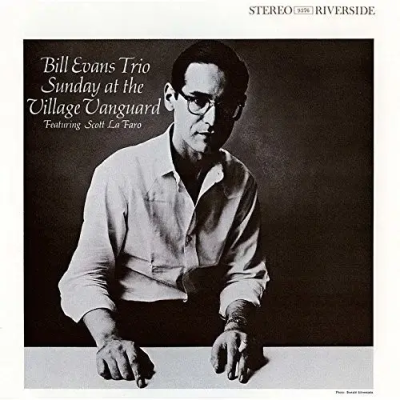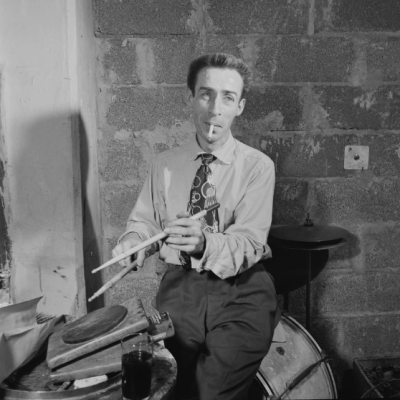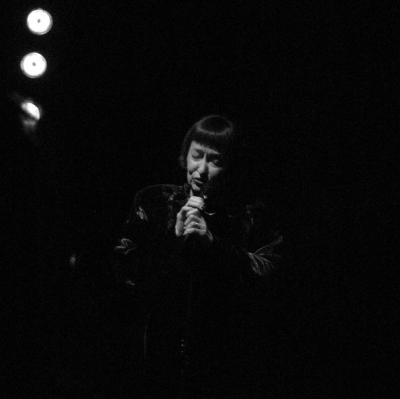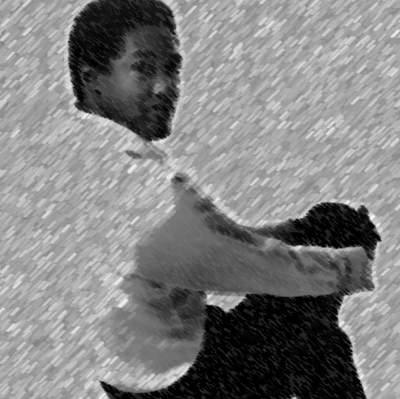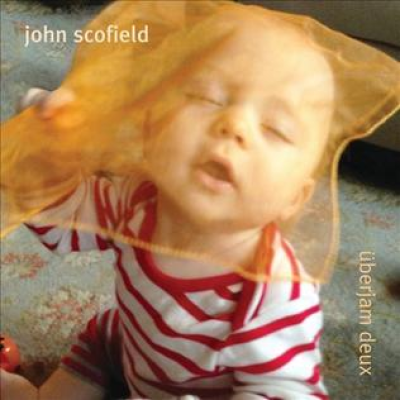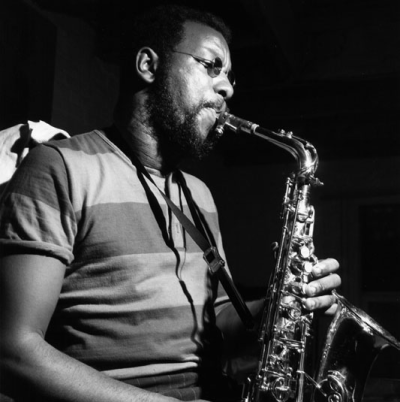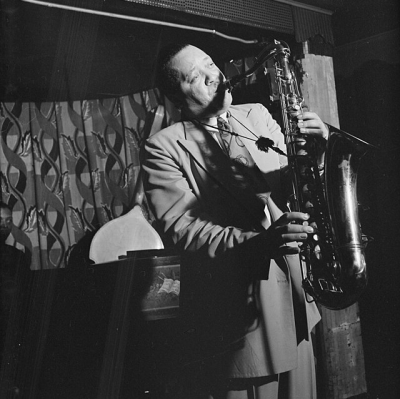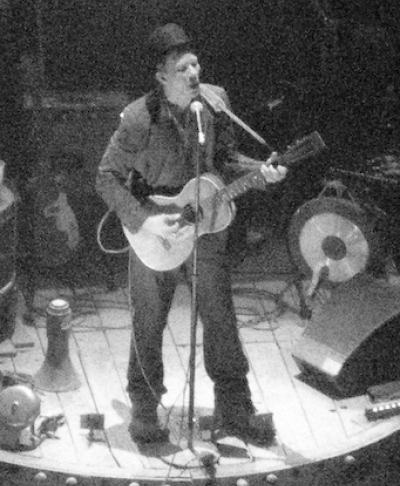“Dizzy Moods,” a short story by Daniel Alvarado, was a runner-up in our 38th Short Fiction Contest. It is published with the permission of the author.
*
Daniel Alvarado is a writer and cyclist from Los Angeles, California. He mainly works on short fiction and poetry.
__________________
Dizzy Moods
by
Daniel Alvarado
_____
Three cars honked almost in union. Then successively, each a blare in order, one two three, then two three one three four with the line through, beat ripitum boom, ba, riptum boom, now hear it a little faster, just a little faster, lips to instrument, trumpet, three valves, infinite notes to jot to sing to blow, perched lips, fat cheeks, cosmic energy of the union, the intertwined with keys of ivory.
Marcus Breck was recalling stepping on stage the first time. Nervousness rising from toes to a tingling head. Dry mouth, the initial silence of the room that precedes the beginning of play. But his lips to the mouthpiece, synchronicity of the band, produced utopian sound. Marcus knew they were on point. He knew it. He felt it. It all, the speed of a dream.
The sun bowed out giving way to fresh crisp air, an indication of Autumn. The soft shaking of the trees from the planet’s natural breath. Marcus sat on a bench in the main street park of Ojai. On the edge, hunched forward, his arms lay across his knees, the stars among their empyrean bed. Their measureless reason, moving through the sky from this fixed perception. Diverting his eyes from above to his phone, he received indication that there was still about ten minutes until Rebecca Abell would arrive. A blind date of sorts. Marcus was heading south back to Los Angeles and was convinced by their mutual friend to stop through to meet Rebecca for dinner.
I’m a musician. I am a musician. I play music. I’m a jazz musician. I’m in a band. I play trumpet and piano. I play a couple instruments. Jazz. I’m a composer. I’m an artist. These mock conversations rambled on inside his head. A gifted composer, trumpeter, and pianist, he rode peaks of blaring confidence and valleys of self-doubt. Do you do that full time? No. I have a day job. What do you do? I’m a janitor. I’m a groundskeeper at a school. I clean up shit. I mop after brats. Janitorial work. I teach kids music. I’m a janitor. Well, music’s my passion. It’s my life. I’ve always been playing and I always will and being a janitor is just to pay the bills. My music is my work. Being a janitor is just my hobby. Typically, people viewed his craft and artistry in a positive light, but he often found that non-artistic individuals had difficulty understanding the differentiation between his work and his job. His work was his music, and it was a life’s work. His job was utilitarian.
A taxi pulled up and the door opened. Marcus’ attention came back to anticipate the figure who’d emerge, but was two brothers of the cloth. One of the priests and Marcus made eye contact. Both smiled and nodded acknowledgement. Marcus always wondered how people perceived him and feared assumption regarding his person, which meant an affable expression was commonplace amongst the place between his engaging green eyes and square stubble chin. He was good at convincing people he was content and calm when he actually wasn’t.
Generally Marcus got along well with others, but harnessed a lot of quick anger, which he bottled. Regret was never a word associated with his music. However he wasn’t sure if he should regret the life choices he made which could have led to a better paying job. Marcus anticipated criticism from others. When he knew he’d have to explain who he was and what he did, he spent a lot of time envisioning their criticisms or backhanded comments surrounded by subtle passive aggressiveness making it difficult and or awkward to rebut. So he would fantasize these conversations a lot and practice his perfect response, which he never had, since when these incidences happened, it was always a slightly different situation and wordage. The time, when it came, his fame and recognition, would shut up the world and the talkers and the laughers.
Are you Marcus, asked with an intonation somewhere between unenthusiastic and somewhat enthusiastic.
To his right was a woman, dark woven hair and olive complexion and large blue eyes. A nervous smile. Standing up to greet her. Yes I am. Extending his hand. In simultaneity, expressing their pleasurable acquaintance. The simple how are you’s and I hope you weren’t waiting long and did you find it okay transpired timidly.
Entering the restaurant. “For two” was indicated to the host. A right this way and they went to their table, smiles, thank you’s and menus. They knew it’d begin now officially, and so it did with have you been here before, everything sounds good on the menu and two wines. Marcus knew this place would cost him, but so it was, he knew he could afford it. Marcus thought how Rebecca was really quite extraordinary, a character perfected from a 60’s stereotype. A kind of woman whose looks blew out the lights and confidence shut the door and pictures circulated military barracks on a calendar.
The dimly-lit restaurant was adorned with second-rate paintings of valleys and horses. Marcus thought about how overpriced they were. Who actually left here saying, you know what, I’ll buy one of these.
So tell me about yourself Rebecca, Marcus chuckling, since I actually don’t know anything about you, thanks to Jeanie.
Rebecca smiled, but was solemn opposite of Marcus’ light tone attempt.
Well I moved up here about two years ago to escape the craziness of the city. I’m a lawyer, so the job can be hectic itself.
Marcus already regretting, recognizing her attitude. There was a tone in her voice. He knew this tone. But he was in it now. He did his best to want to care.
What do you do Marcus?
I’m a musician.
She paused with a hmmm then a How’s that panning out for you? Panning out for me? he thought. As if there was an option for it to be bad.
Um, it’s fine.
Marcus was unsure how to approach this.
Music can be a difficult career to follow. You either have made it and make lots of money at it, or you’re a nobody and struggle, exclaimed Rebecca adamantly.
Appalled by this inaccurate and silly statement, Marcus responded with a casual higher inflection. Well that’s not really true. Rebecca looked at him, as if waiting for his defense argument to unfurl.
The four walls were building and enclosing him. His box, his thoughts and speech endeavored to escape and unleash on her, but tripping, cementing, going no further. A fuck you could be great right now, something like, I don’t have to explain shit to you, or if you have to ask you’ll never know, but mostly just entirely taken aback by such a stupid comment, so instead of all of that, he politely said, Excuse me I need to use the restroom.
Standing up, to the back, he entered the bathroom. Inside he washed his hands just to do something. Should I just leave? Yeah fuck it I should just leave. Opening the bathroom door, someone was waiting and he smiled, letting them pass in. To the right down through the restaurant, he saw Rebecca on her phone typing, and to his left was the passage to the outside deck. Marcus went left.
The open air, the stars. He had to smile. Justifying his rudeness with an internal fuck you. The car off in the darkness. Sporadic lights whipping into view and out. The low hush of the night open road. Ocean to the right, small waves flickering in the moonlight. The moons force pulling and pushing, pulling and pushing over and over and over until the end. A few other cars on the road going where they need to go, containing people with their own problems, own stories, own worries. How many remember the moon? The push and pull. The forces that we cannot control. Surrender. What problems are real and what problems are trivial? If he didn’t want to stay with her, then so be it. Perhaps he could have made up an excuse on having to leave so as not to hurt her feelings, but then again, did he really give a shit? What consequence to the moon did walking out the back have?
On the car stereo was Duke, Mingus, Roach. Outside his rolled down windows, cold breeze came piling through at an exponential wind speed and beyond it, he could hear the waves crashing and culling and he, in a rush of memory, recalled a moment on the beach, irritated by the sand in his pants, pockets, tried to focus on the rhythm and beat of the sea, the rhythm and beat of the sea, focus hmmm ba doo bawaahaha but his mother said come, we have to go home now, but he was drawing a triangle in the sand, the mean and right, taunted and laughed, degrees and area and logical arithmetic swallowed him, fearing judgment of other kids, especially the girls. High school. He knew he was no academic. Someone sneered and he said give me a trumpet or my fists, who will sneer then but he said nothing, he took it all and buried it deep. Marcus would never forget the individuals who criticized him in school or throughout his life. All of their faces, very present in his memory.
The next day, the sun shining, the walls, again, enclosed, four they contain. Sweep mop blunk, the workings of Marcus, laborious. Going on now three months, he worked at a high school in a wealthier area on the west side of town. Overqualified for the menial and under-qualified for the skilled, he actually faked his resume to get the position. Stuck between a crumbled economy and questionable personal choices, he did what he could.
The youths, thirteen years to eighteen, snobbing, avoiding him. Non-avoidance a result of hushed snarky commentary. The eyes that passed, either viewing, or avoiding, what were their reasons. Shame, knowledge of failure, acknowledgement and judgment, did they know? Did they know? Wannabe jazz musician washing, mopping your shit, your piss, your cum and blood in the bathrooms, hallways, and schoolyard. Paranoia would strike him and make his body feel odd, as if he was surrounded. Anytime somebody looked at him, he thought they were judging him. The sense of them versus him was overwhelming. For the first time in his life, he asked himself, do I have a social disorder? Or were those silly thoughts? Everyone has their shit they deal with. Marcus was only twenty-eight but sometimes in his worldly frustrations, he felt like an old man. The old dog that was given the new trick, which quickly passed over his head. It’s not that he hated people or didn’t get along with them. Whenever people were laughing anywhere, he assumed it was about him, and when he looked at them, they at him, it only perpetuated the paranoia. His fear of others’ opinions was quite crippling.
One younger looking boy, wearing all black, cut shorts, enlarged hoodie, walked by Marcus whistling something oddly familiar. A piano composition. Perhaps Monk. Lulu? The boy looked up at Marcus and smiled. Marcus returned the gesture with a nod. That was the first time any of the kids acknowledged him amicably. The kid continued to the doors and exited the building. What was that song he thought. He knew it.
That night, Marcus in his apartment, he sat at his piano. The room, off-white, somewhere between salmon and putty, depending on the light. A humble space adequate just for his things. The dresser which was in the closet was broken, but sufficiently functioned storing t-shirts, undies, and socks. He was beginning to wonder if some of his clothing, stylistically speaking, were now overstaying into his adulthood. A wicker hat and a dark blue shower towel hung on the open closet door. The room had a bed, bookshelf, and desk; the necessities. The bookshelf filled with classic films. Some Godard, some Miyazaki, some De Sica, some Micheaux. Over the years, he’d begun to love minimal living more and more. Having come from a well-off family, there was always enough, and unarguable excess. Well, excess in relative terms he thought. Now in his reduced living, Marcus enjoyed smaller spaces, less clothing options. The kitchen required no more than two plates and a glass, and a mug. His plethora of shit was re-considered, the best were chosen, the rest given away. Less was more.
Marcus did not have to work as a janitor. His education and family wealth gave him opportunities beyond a position of that sort. However, focusing on his music, he never believed in the push for a steady lifelong job, because his music was just that. However, now, as he never fully jumped to reach his potential, his resume only allowed for certain jobs that were less desirable. As a janitor, people made assumptions, many assumptions, but on the contrary, he was much more, much different than what people thought. It was a reason Marcus had a knack for reserving judgment of others. Naturally, he’d make observations and opinions, but was quite good at retracting negative ones and reminding himself to refrain. He’d remember himself, and what people might presume about him, and of course, fully knowing his story and character, he’d hope others would abstain. So in light of that, he tried to do the same.
Fingers to the keys. His compositions were always done via the piano but the accompaniments were always fading in and out of his head. He kept two notebooks next to the piano. One was for the immediate piano music he wrote, and the other for his ideas as a whole. Various notes and scales to incorporate. Sometimes they were conceptual ideas or feelings, moods that were to be considered later. Saxophones, trumpets, drums, basses, or clarinets, bugles, yelling, chanting, trombones, guitars, whistles, bells, anything that made a noise was fair game. Musical expression was not bound my limitations.
Three four with the line through, beat ripitum boom, ba, riptum boom, now hear it a little faster, just a little faster. Honks from the trumpets and clarinet squeaks, bwap RMMM bwap RMMM, bwap pa pa pwaa RMMM, burap! bwap! bWAP! RMMMM Tsss ta ta tsss ta ta ta tss ba bum bum bum doon doon ba bum bum, ba doon doon doon, ba da dum doboo da dobeedoo. The beginning was there, it imagined itself, it came, as it was supposed to.
Or is it, I don’t know. Hmm. Marcus always doubted himself. But so is the mind of a creator. His work rode high conceptualization. They soulfully expressed specific ideas, feelings, themes, and experiences. One of his favorite compositions was about a trip he and some friends did to Las Vegas, creating a three-song reconstruction of the drunkenness, the lights, the winnings and losings, the naked women, and a constantly working twenty-four hour city built on excess.
For a majority of his years, he was quite adamant about his talent. It was only a matter of time before his stuff garnered attention and permeated circles. However years went on and he did not reach the point he thought he would. Opportunities presented themselves and he’d decline. Thinking he was better than them, or fearful. The belief he was not ready. Practice was still needed before showing full competence in view of others. Marcus didn’t quite understand that creative perfection is non-existent. Like anything, it must follow an ever-evolving path. Rudimentary and rigid beginnings give way to smooth developed breathing organisms of expression. Such as birds being the direct correspondence of the saurus species, supposedly. Process, the long difficult inevitability; a constant; the flux; the change, is the constant. Marcus realized at this moment, as he had other moments, in other places, in other times, that he did not show proper courtesy to this fact. But it never quite stuck with him.
Buzzzzz buzzzzz buzzzzz, his phone rang. “Hello?” A loose friend, someone from a similar circle, was offering a session gig to Marcus for the following day. One of the trumpeters dropped last minute and a replacement was vital. As this question was processing, his nervousness and hesitance exploded in his chest and stomach. He wanted to say no he was busy so badly. So badly. But deep down he could not keep running away. Fuck he thought. He knew what was the right answer, but now it’d be bothering him all night. Marcus feared embarrassment so much within a professional setting. Was he competent enough to show up tomorrow and bring it? It’d been so long since he did a commercial gig like this. There’d be lots of musicians. He’d have to listen to pretentious fucks all day. Maybe there’d be that one cool guy. Whoever was running the show would be a dick. It was time for Marcus to take hold of his career. The necessity that comes sometimes with doing things you don’t fully desire, to help further personal goals. Bridge burning and hermit like tendencies could no longer be a professional thing. Chance, risk, ambition. Laziness would no longer do. Unchallenged talent has no space to grow. Yes he said to Jack over the line, Yes I’m available, said with the best confidence he could muster. The conversation continued for a minute about the details and where and when and then the goodbyes and a thank you.
His body was feeling a rush of nervousness and excitement. His entire memory core involving composing and playing and gigs and jamming and failing and nerves and fear crashed together. Buzz buzz buzz, his phone vibrated a message. A quick peek to see, and it was from his brother Max. The message said its happening. St Marys. His eyes bulged and mouth opened. “No shit.” As quick as he read the text, he grabbed his wallet and keys and shoes and out the door he went.
Night upon the buildings, the city light, the glow drowning the cosmos. Beyond the city, the state, the country, the atmosphere, the galaxy, solar system and whatever otherworldly planes, the metropolitan bubble denied and washed out the existence of all other entities. There was just Marcus, in his three-ton metallic machine smoothly voyaging through the system of roads, structures and lights. A homeless man, his clothing as tarred, and dirtied as his skin, wobbled on the sidewalk in a somewhat forward motion, mostly appearing to avoid collapse. Hills and palm trees swaying among the downtown illumination. Marcus distracted by the thoughts of what was about to be, a new baby, almost ran a red light in front of a police officer. Slamming the brake to a complete stop. A couple kissed at the corner, the man squeezing the woman’s ass as tight as he could. Glancing away to the cop, he noticed the cop’s tunnel vision of the hand to ass event, because he did not progress through the green.
Arriving at the hospital now, seeing a meter, Marcus immediately bombed into the spot. Ignition off, door open. Upon the street, the city stood in a unique temporary silence. The hospital standing in a stillness, despite knowing the chaos inside. Gun shot wounds, car accident survivors, domestic abuse victims, last leg cancer patients, screaming babies coming in, and agonized souls going out. But this chaos was contained within the stoic white box. Boxes within a series of other boxes. Each containing a small hole to perceive the box surrounding it, which itself contains an even smaller hole. That was everything, that was all, just something inside of something else, and how deep did that go. The breeze came and he went forth, the pulse of the city returning from its solitary moment. The vibrations and roars. The muffled, distant sirens faded out further as he entered Saint John’s.
The security guard told him visiting hours were over, but Marcus pleaded with him. His heart racing, passion driving his speech for compassion. The guard looked into his eyes and conceded, telling Marcus thirty minutes maximum and no more than that, because he knew which room he was going to.
Thank you so much, you don’t know how much I appreciate this.
Into the room, steady, one could hear the breaths of those inside. Sadie and Max, Sadie in the bed, Max in the bathroom. Entering, Marcus only saw Sadie and approached her softly. Tired and drained, she smiled lightly, and he kissed her on the head. Peering to his left was a small box, obscured by his angle, he rounded the bed to approach it closely, and there she was.
A nugget of truth. Approaching the box.
So what did you decide on?
Sadie softly responded Sophia.
Can I pick her up?
Yeah yeah. Is she asleep?
She is.
Okay, it’s fine. It’s fine.
Marcus extended his arms and body to the bed and scooped Sophia up in his arms.
I don’t think I’ve ever held a baby this young before.
Slightly awkward, he was finally able to comfortably situate her in his arms with proper care and head support.
Marcus’ eyes began to tear. Max exited the bathroom and approached. Marcus looking up at his brother with tears in his eyes, Max smiled; put an arm around him.
This is incredible. She’s only two hours old, Marcus said.
Imagine what it was like to see her come out, said Max.
Marcus looking at her, Sophia’s miniature body close to his face, she opened her eyes. Her eyes, the mind, with no words to think or communicate. Pure sensory. Looking, trying to figure out where she is. A question that never dies. Her existence requires no validation, she is, and that is perfect enough. Perfection, an idea only possible to those who do not ask questions.
This is incredible.
Max went over to the bed and kissed his wife on the head. Marcus looked at them and said; In three months time she’ll have a sturdy neck to see and look, six months time, some teeth to eat, a year to walking and year half to yapping words and phrases.
Marcus was amazed by all of this. The months and years flashing by with constant development, constant progress. He thought to himself how he’d never want her to reach that moment where she feels she can’t move forward or progress or do what she wants to do out of fear. Beautiful and serene. Marcus sighed.
The Earth spun and proceeded along its trajectory as Marcus slept restlessly in his bed. Drifting in and out of sleep, nothing that’d amount to deep rest. No dreams, just repetitive anxious thoughts. The darkness began lifting and the sun came up as his survival instinct awakened him. Eyes open, his alarm went off. This was it Marcus thought. No more excuses. No more fucking excuses. Looking at the clock, he determined he had about one hour and a half to get ready.
The warm water from the shower did very little to calm his nerves. Out of the shower, he looked at himself in the mirror. Speaking out loud to himself, who are you dude? You big fucking loser.
Out in the kitchen he hummed to himself sipping coffee, cooking up his eggs. Checking his phone for the time, he had one hour. The commute was very short. Scarfing his eggs down, he hummed on. Afterward, he went to his room to grab his trumpet. Opening the box to make sure he had everything. Closed, locked, and out the door.
Sitting in his car, the key was in the ignition, but the engine was not running. The car beeped indicating this. Marcus sat and questioned whether he should go. His mind running anxiously. All I have to do is take the key out and go back home. Don’t. I don’t have to go though. No don’t burn this bridge. Fuck, but I don’t have to do anything I don’t want to. Why is this so hard for me? Come on, just turn the key. Marcus placed his hand on the key, but did not turn it. Sitting there still, he continued to argue. What about Sophia? What would she think? She can’t, she doesn’t know anything yet. What would any rational person think? That you’re a ridiculous idiot. Come on, turn the fucking key. The engine roared and was on. There ya go. I could just turn the key back and remove it he thought.
Just put it in drive and go!
Marcus sat, hand on the keyed ignition, debating, unsure of what to do.
__________
“Till’s Piano Lessons,” by Donald Dewey, the winner of the 38th Jerry Jazz Musician Short Fiction Contest







